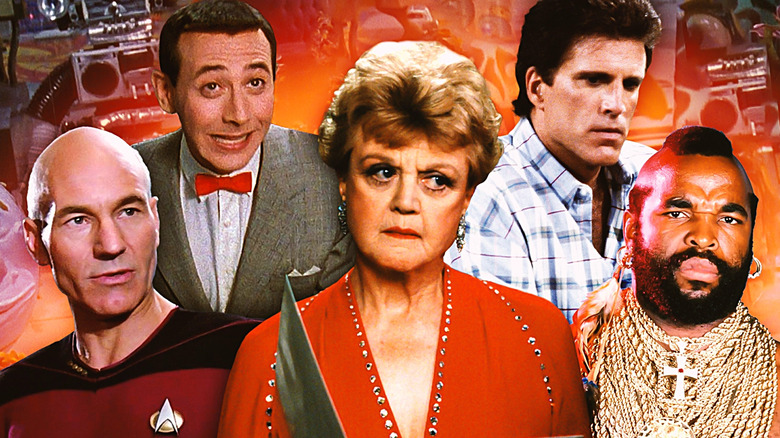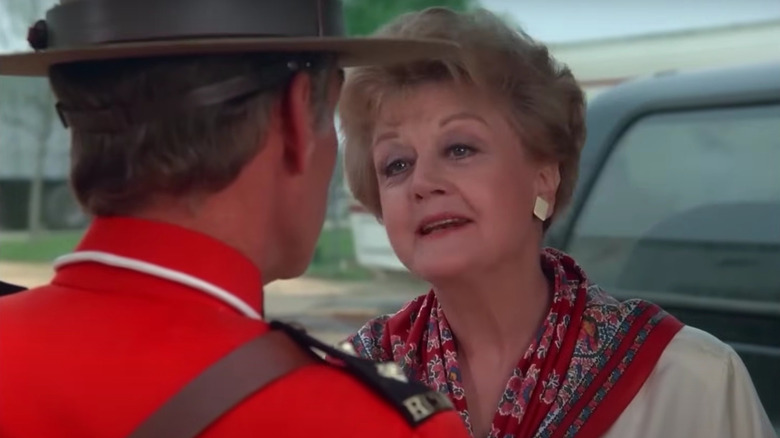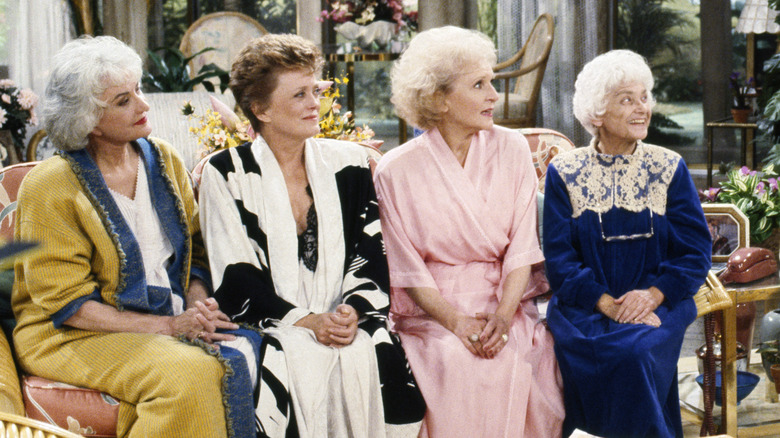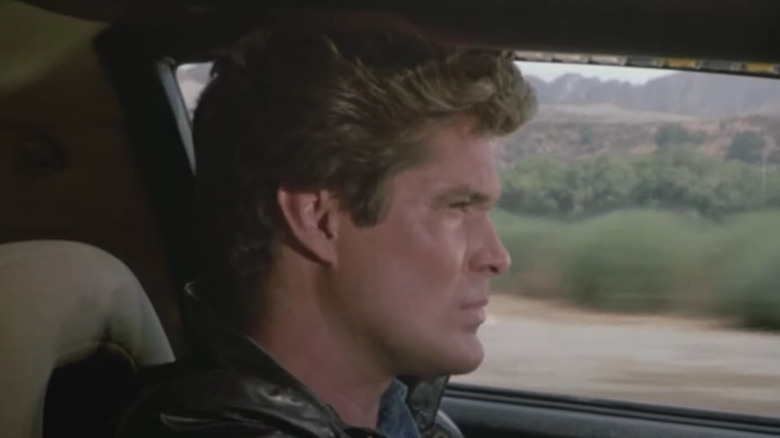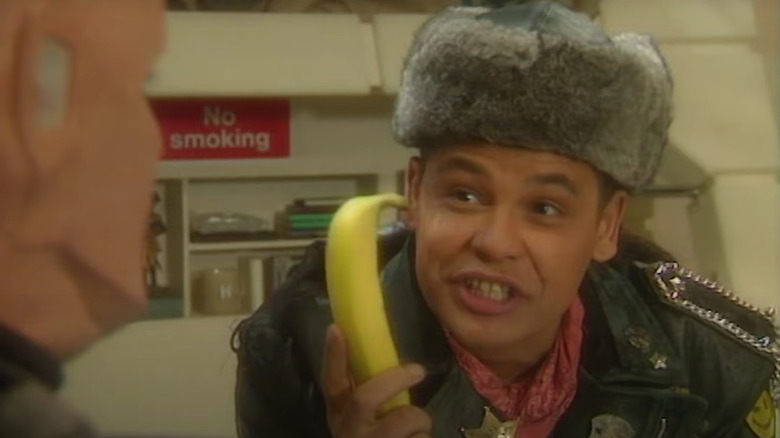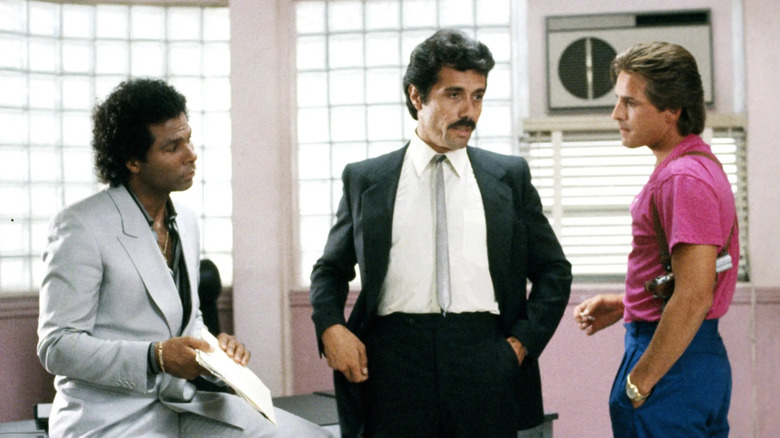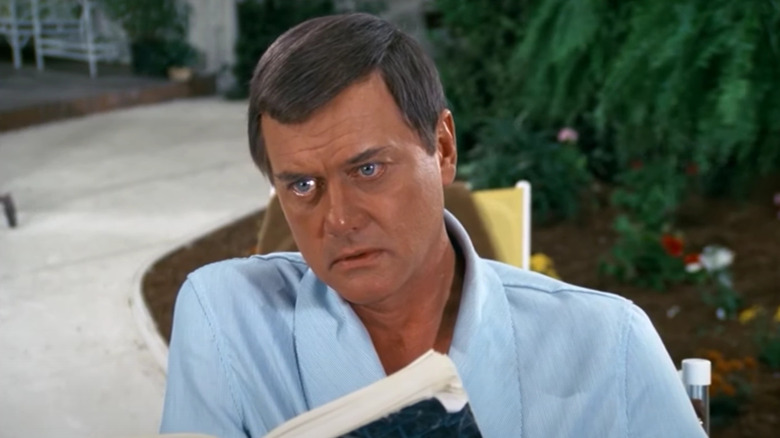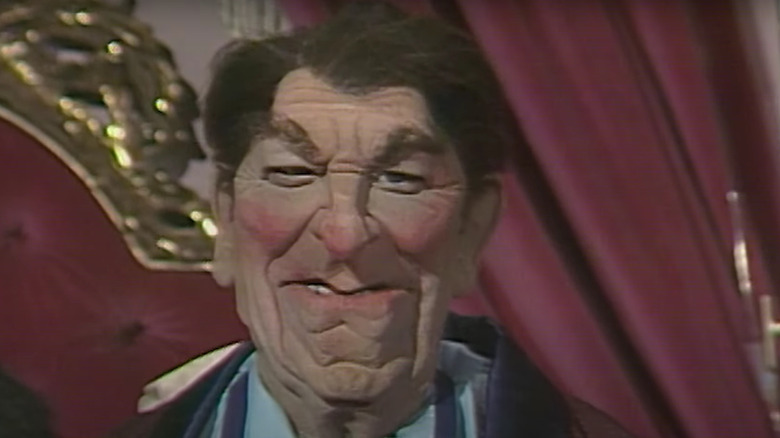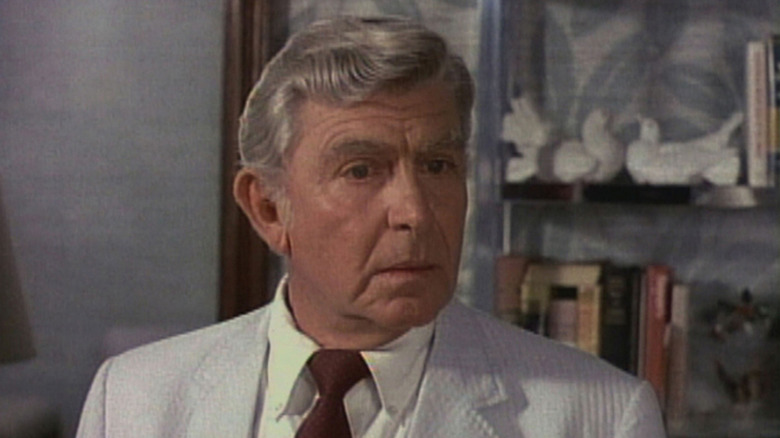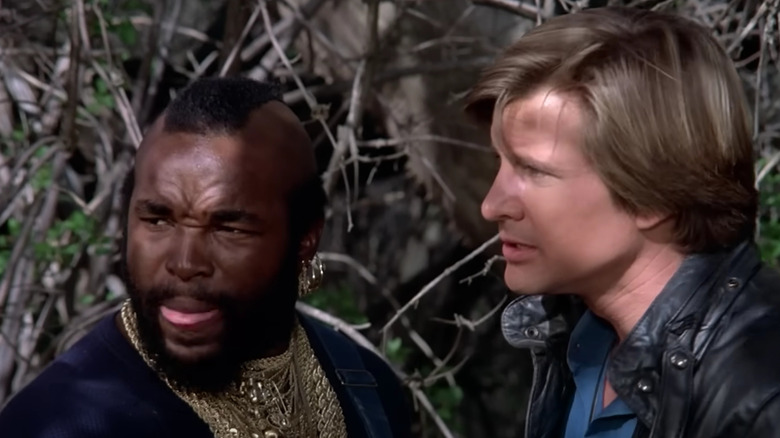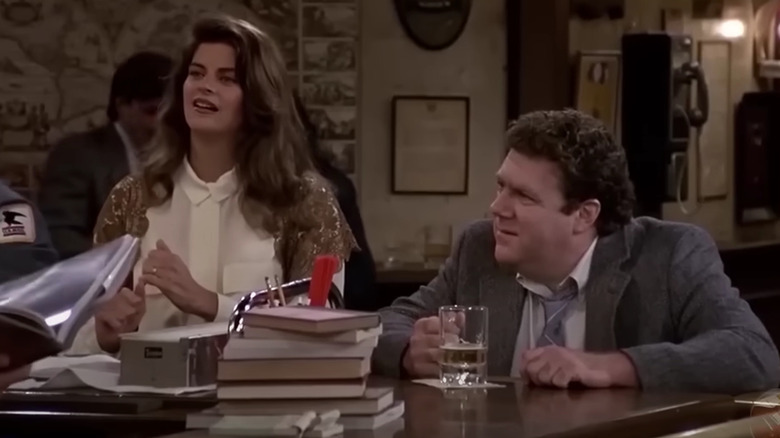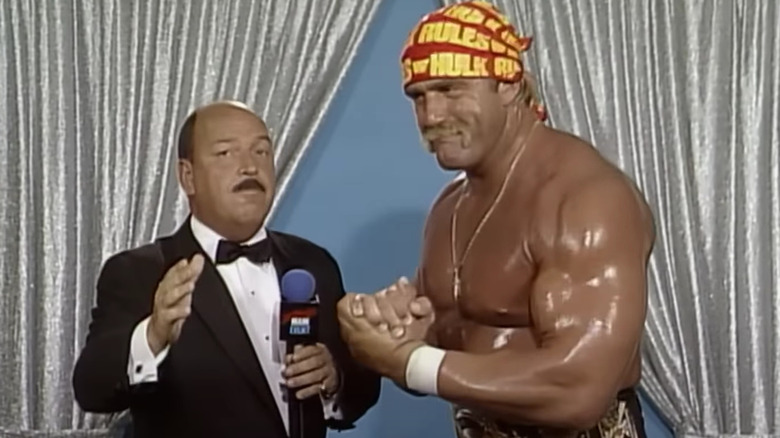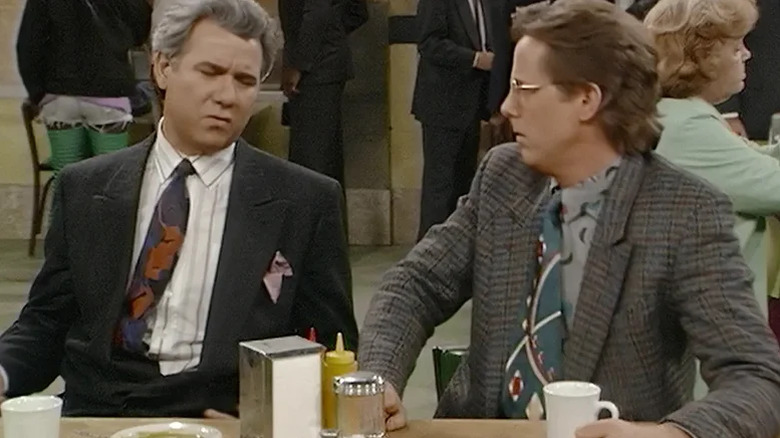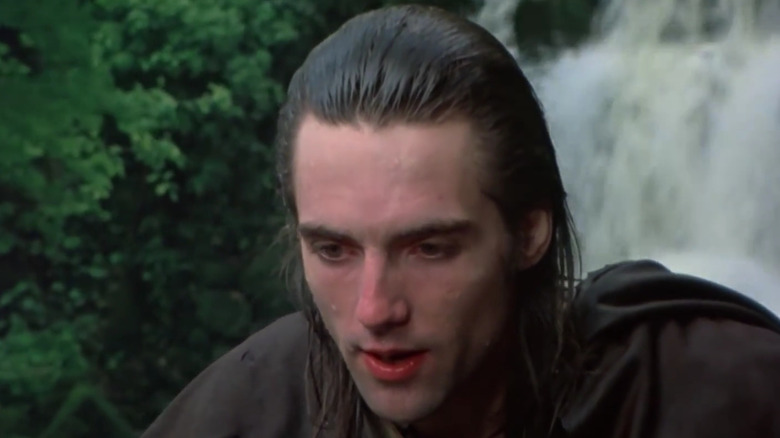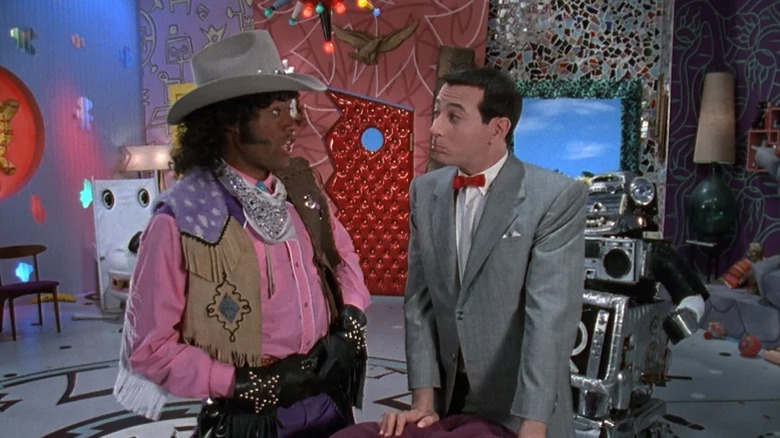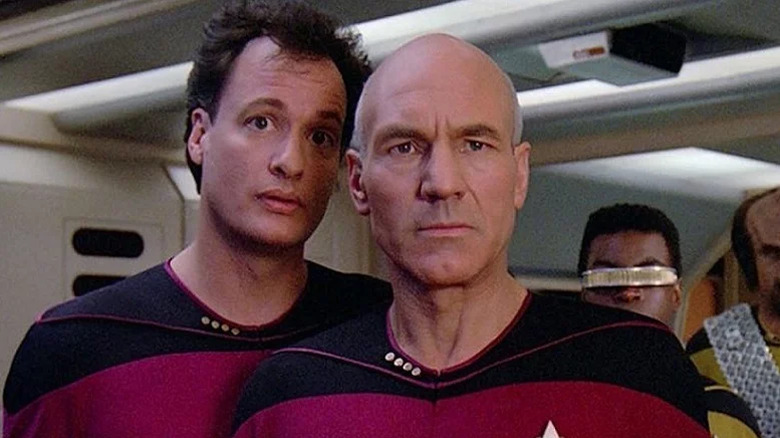The 15 Best TV Shows Of The 1980s
Media in the '80s was full of larger-than-life personalities, and TV was no exception. From high-concept action to star-driven crime solving and even confined comedies, bigger was usually better. Some of the best shows just kept growing, and a couple of the titles on this list of the best 1980s TV shows are still around (or at least have been revived very recently). Those that didn't last nonetheless made their mark on pop culture at large.
While not every show named below is an American show, they are all, to some degree, scripted. Even though the decade spawned many iconic talk shows and nonfiction programming, with hosts ranging from Phil Donahue to Robin Leach, those are best covered elsewhere. These are the stories that kept us coming back to their characters, actors, plots, and wild gimmicks, in a decade where money was seemingly no object, and TV tried to cater to every age group.
These are the 15 best TV shows of the 1980s
Murder, She Wrote
A very loose, modern riff on Agatha Christie's Miss Marple, Jessica Fletcher (Angela Lansbury) was a successful mystery novelist, back when that was still a thing that made people famous. Every week, either in her hometown of Cabot Cove or on a trip away, somebody would get murdered. The police generally jumped to conclusions, but thinking like a writer, Fletcher would figure it our first and invariably confront the culprit, usually extracting a confession right before the law arrived.
Most '80s network shows were meant to be viewed as individual episodes rather than a cumulatively storyline. As such, the folks of Cabot Cove never ran Jessica out of town on a rail for making it a death magnet every week. By the end of the series' run, many of her friends and family had been killed. In reality, there was plenty for Lansbury to smile about, as she was frequently able to hire many of her older actor friends as guest stars to maintain their SAG pensions.
The Golden Girls
What if older women existed? It seems such a radical premise nowadays for a TV sitcom, but back when there were only three major networks, with Fox coming in as #4 at the tail-end of the decade, programming had to appeal to everyone, and network executives understood that it wasn't just the 18-35 demographic watching. In the decades since first airing, "The Golden Girls" has become beloved by subsequent generations, inspiring drag queen camp, official pop-up cheesecake restaurants, and the general worship of Betty White as a national treasure.
The premise was simple: Three older, now-single ladies move in together, along with one of their mothers. No-nonsense Dorothy (Bea Arthur), horny Southern belle Blanche (Rue McClanahan), forgetful and possibly senile Rose (White) and righteous matriarch Sophia (Estelle Getty) lived, loved, and occasionally indulged in uncomfortable stereotyping of Sicilians and Scandinavian-Americans. When the original show ended after seven seasons because of Arthur leaving, the spin-off "Golden Palace" saw the rest of the girls taking over a hotel.
Never defined by the men in their lives, the Golden Girls may have been aimed to appeal to seniors, but thanks to many classic episodes, they remained sassy, uncompromising TV role models to women of all ages.
Knight Rider
On the face of it, "Knight Rider" was one of many crime-fighting shows with a sci-fi gimmick: in this case, a bulletproof, talking car named K.I.T.T. (William Daniels). The backstory is a bit darker, with billionaire Wilton Knight (Richard Basehart) rescuing a facially injured cop from certain death, giving him plastic surgery to look like his own son and renaming him Michael Knight (David Hasselhoff). Officially part of Knight's public-facing law and order program, Michael also goes into action with KITT when the law proves inadequate.
Working with an awesome synth score and the coolest looking car on TV, former soap star Hasselhoff proved ready for prime time, and his career would later see him star in the "Baywatch" franchise, become a rock star in Europe, and embrace his status as a retro-camp icon. "Knight Rider" is also notable for continuing the "goateed evil twin" trend begun in the mirror universe on "Star Trek." When Knight's real son Garthe shows up, he is of course a criminal mastermind, and also played by Hasselhoff, sporting "Iron Man" facial hair for the role.
Red Dwarf
Sci-fi sitcoms are a rare subcategory, so for a British sci-fi sitcom that began in the '80s to survive through the present day is downright odds-defying. "Red Dwarf" starred Craig Charles as Lister, the lowest ranked crewman on the eponymous deep space mining vessel (though it almost starred Alan Rickman and Alfred Molina). Briefly put into suspended animation as punishment for bringing his cat aboard, Lister awakens after three million years to find his crewmates died shortly thereafter. The only survivors besides him are a hologram of Lister's annoying roommate Rimmer (Chris Barrie), the ship's pessimistic AI Holly (Norman Lovett), and a descendant of Lister's cat (Danny John-Jules) who has evolved to become fully humanoid. They would later add sanitation android Kryten (David Ross, then Robert Llewellyn).
Creators Rob Grant and Doug Naylor wanted to focus on characters first and foremos, and they found typical authority figures on sci-fi shows less interesting. In many ways, "Red Dwarf" is the great grandfather of "Star Trek: Lower Decks," though it may have outlived its descendant. After eight seasons on BBC Two, then four more plus a movie on the free digital channel Dave, there's still talk of more (though as of 2025, it's not looking good). An American remake pilot starring Craig Bierko was shot for NBC, but it remains bootleg-only.
Miami Vice
Colorful, violent, sexy, cynical, and hip, "Miami Vice" initially blew away the crime-fighting competition with ripped-from-the-headlines stories, grisly consequences, and stars Don Johnson and Philip Michael Thomas as Crockett and Tubbs, both redefining hero attire with their T-shirt under sports jacket combos. Johnson became a star, and gave Edward James Olmos his most defining authority figure role. The soundtrack was hip, launching hits like Phil Collins' "In the Air Tonight," and eventually even making Jan Hammer's theme tune a top-charting single. Johnson and Thomas' brief, respective attempts at singing careers are probably best not discussed.
Original producer Michael Mann went on to become an acclaimed filmmaker, though when he remade "Miami Vice" for the big screen without the '80s palette and hipness, it didn't feel the same. Losing the humor had previously hurt the series, and after Mann left, Dick Wolf took over as the show was moved opposite the "Dallas" time slot, and its popularity faded. Not even Sonny Crockett could defeat J.R. Ewing.
Dallas
There were many primetime soaps in the 1980s, full of rich and beautiful people screwing each other, and screwing each other over, but "Dallas," which technically debuted in 1978, was the kingpin of them all, thanks to Larry Hagman as ruthless patriarch and oilman J.R. Ewing, and a series of audacious cliffhangers and twists. The mystery of who shot J.R. may be the most famous; the retconning of an entire prior season as just a dream, simply because "killed-off" actor Patrick Duffy wanted to come back, the most infamous.
Unlike Hagman's previous most notable role as hapless hubby Major Nelson on "I Dream of Jeannie," J.R. wasn't a guy you were supposed to like, yet audiences tuned in every week to see just what new misdeeds he'd do. Like Gordon Gekko in "Wall Street," he was a character that represented the unfiltered economic id of the Reagan years, and would up being idolized by all the wrong people.
Spitting Image
If you like the "Saturday Night Live" sketches that parody politicians and celebrities with pitch-perfect impersonations, look back to "Spitting Image" for mastery of the form, with grotesquely exaggerated puppets by Peter Fluck and Roger Law, who dubbed themselves "Luck and Flaw." The UK satire show depicted the royal family as idiots, Margaret Thatcher as a literal Nazi, Ronald Reagan as an imbecile, Pope John Paul II as an aspiring rock star, and the likes of Sting (who went along with the joke) and Bono as pompous know-it-alls. The show even had a number one hit single on the UK charts: "The Chicken Song," a parody of the nonsensical "Agadoo" by Black Lace.
The U.S. got a taste of the show both via special American episodes, and the Grammy-winning Genesis music video "Land of Confusion," which depicted the chaotic history of society as a nightmare being had by Reagan, prior to him accidentally starting a nuclear war. The series was revived on Britbox in 2020, but the original helped launch the careers of British comedians like Steve Coogan, Adrian Edmonson, Chris Barrie, and Harry Enfield.
Matlock
"L.A. Law," with the sex appeal of Susan Dey and Harry Hamlin, may have been the hotter legal dramedy back in the day, but "Matlock" has the longevity, combining mass audience's love of simplified legal dramas with '80s TV's love of old character actors solving murders (see also "Quincy, M.D."). Perhaps we can thank (or blame) "The Simpsons" for making "Matlock" Grandpa Simpson's favorite show, or maybe it was just that older audiences did legitimately love it already.
An antidote to younger action heroes solving crimes with gun, "Matlock" gave us Andy Griffith as a sly country lawyer who always managed to prove his clients' innocence by figuring out who the real killer was. Viewers who grew up with him as Sheriff Andy Taylor on "The Andy Griffith Show" could feel comforted that he was still making the world a better place for law-abiding citizens, with a smile.
Griffith might have preferred a darker show, but he was overruled. The series has since been rebooted with Kathy Bates on NBC.
The A-Team
Perhaps the most '80s show to ever '80s, "The A-Team" followed four unjustly accused Vietnam veterans who escaped a maximum security prison to hide out in Los Angeles, despite being four of the most conspicuous human beings on Earth. Dirk Benedict's Templeton Peck was movie-star handsome, Dwight Schultz's H.M. Murdock a delusional and loud mental patient, George Peppard's Hannibal Smith wore over-the-top disguises that fooled no viewers, and B.A. Baracus was, well, Mr. T. They constantly evaded the law, however, and every week helped people who were being victimized by criminals, evil bosses, militias, and other bad dudes.
Almost invariably, the villains would trap the heroes in a junkyard or warehouse-ish location, whereupon the A-Team would fashion an arsenal of homemade weapons, fire off thousands of rounds, and somehow (almost) never kill or wound anyone, due to a network mandate. Nobody tuned in to be surprised, as the show maintained the exact same formula for four seasons, changing things up only in the fifth when the group started working for Robert Vaughn's General Stockwell. But it didn't save the show, and by 1987, kids who had grown up watching the team were ready for something even mildly more sophisticated.
Cheers
Watching an episode of "Cheers" was like hanging out at a Boston bar with all your friends. Everyone was fun to be with, and the banter between beers would mostly be hilarious rather than problematic. It was a series that made stars out of Ted Danson, Woody Harrelson, John Ratzenberger, and Kelsey Grammer, and the latter even played the same character for decades.
Would snooty Diane (Shelley Long) and reformed alcoholic womanizer Sam (Danson) ever get over themselves long enough to get along, or would Sam match better with neurotic Rebecca (Kirstie Alley)? Was intellectual nice-guy Frasier (Grammer) really a good match for ice queen Lilith (Bebe Neuwirth)? What random trivia would Cliff (Ratzenberger) suddenly deep dive into? Would we ever meet Vera, wife of regular Norm (George Wendt)? For such a seemingly limited setting, the wide variety of personalities on display kept viewers enthralled for 11 seasons — it's tough to judge which ones were the best — followed by 11 more of the spinoff "Frasier," featuring Grammer's psychiatrist character ,now as a radio host in Seattle (and then that show got its own revival in 2023).
Saturday Night's Main Event
When Vince McMahon Jr. changed professional wrestling from a series of local promotions and fiefdoms to a field dominated by one big nationally televised promotion, he also changed the prevailing style. Rather than performers who looked like collegiate athletes and barroom brawlers, the World Wrestling Federation gave America steroid-sculpted superheroes in spandex with broad, cartoonish personalities representing ultimate good and evil.
Real-life He-Man action figure Hulk Hogan led the charge as the ultimate "Real American," but to see him wrestle, most fans had to either attend live events, or watch the periodic "Saturday Night's Main Event," which occasionally ran on NBC in the "Saturday Night Live" slot. Hogan took on stereotypically evil Cold War geopolitical enemies like Nikolai Volkoff and monstrously large villains like King Kong Bundy. On commentary, McMahon pretended to be a hapless announcer thoroughly offended by cheating, while Jesse "The Body" Ventura rooted for the bad guys and against Hogan, whom he genuinely disliked.
The actual wrestling wasn't particularly Greco-Roman, as huge guys with huger muscles yelled at the top of their lungs and punched each other. To kids of the era, however, it was like watching comic books come to life. Toys, cartoons, spin-offs, and minor movie careers for both Hogan and Ventura followed.
Night Court
High-stakes murder cases dominated most legal TV shows of the era but not "Night Court," a sitcom about the weirder, more low-stakes cases that came before an after-hours New York courtroom. Presiding judge Harry Stone (Harry Anderson) would rather have been a magician, while assistant district attorney Dan Fielding (John Larroquette) spent more time sexually harassing women than doing his job, though he'd pay for it eventually. Colossal bald bailiff Bull Shannon (Richard Moll) had a childlike naivete, usually contrasted with that of a sassy older female partner (Selma Diamond, Florence Halop, and Marsha Warfield). Notable guest defendants included Yakov Smirnoff as a Russian immigrant named (naturally) Yakov and Brent Spiner as a hillbilly patriarch.
From Bull's belief in aliens to Dan literally selling his soul to the devil, the stories could get pretty surreal and absurd, though some episodes would occasionally get serious about issues like green-card marriage and gender transition. The one where Dan's old roommate comes out as a trans woman is more sensitive than you'd expect for the time (or even now).
Sadly, not many of the primary cast members are left, so only Warfield and Larroquette appeared in the 2023 sequel series, which was sadly canceled.
Robin of Sherwood
To date, "Robin of Sherwood" remains the best live-action Robin Hood ever committed to a camera. Shot on authentic locations, adding a mystical dose of pagan mythology and brutal history, and featuring the dreamlike music of Irish band Clannad, this take on the legend never simplified the class struggles of medieval England, and it offered no respite for our outlaw heroes. Even when King Richard (John Rhys-Davies!) returns from the crusades, he proves just as unreliable as his brother John, albeit in different ways. Robin (Michael Praed) actually dies at the end of the second season, to be succeeded by a new character who takes on the mantle, Robert of Huntingdon (Jason Connery).
Ray Winstone made a powerful early appearance as Will Scarlet, while Mark Ryan's double-sworded Nasir began the tradition of Robin having a Muslim ally in subsequent adaptations. Praed's Bono-style, long-hair mullet may not have aged well, but everything else in the series has. Keep an eye out for original Boba Fett actor Jeremy Bulloch as Edward of Wickham.
Pee-wee's Playhouse
Tim Burton made Paul Reubens' Pee-wee Herman persona a movie star in 1985 with "Pee-wee's Big Adventure," but "Pee-wee's Playhouse" proved to be the ultimate expression of Reubens' retro-corny, hyperactive, and surreal character from his Groundlings days.
Incorporating puppets and characters from his original stage show, but with a larger budget to create an environment as colorful and weird as he could imagine, "Pee-wee's Playhouse" appealed to adults nostalgic for shows like "Howdy Doody," kids who liked colorful and weird characters, and teens who just thought the character of Pee-wee was hilarious, having caught his act on the big screen. The furniture talked, the robots were homemade, Cyndi Lauper sang the theme song, and Phil Hartman and Laurence Fishburne (whom Reubens knew through a lighting guy) were among the supporting cast.
Though everything briefly came crashing down when Reubens was busted exposing himself in an adult theater, fans ultimately forgave, and before passing away in 2023, Reubens managed to make another Pee-wee movie and a live stage show bringing back the "Playhouse" puppets. The secret word, as always, was "fun."
Star Trek: The Next Generation
After so many shows featuring macho, jacked Americans, the real action hero of '80s TV turned out to be a very English Frenchman named Jean-Luc Picard.
Spinning "Star Trek" off into a movie franchise had paid off for Gene Roddenberry, but "The Next Generation" represented a bigger risk: a sequel series without any of the original cast (save a DeForest Kelley cameo in the pilot), set in the subsequent century. As it would be a syndicated show, it could also hold more of his vision. In the short term, this meant no conflicts allowed between crew members, because he wanted to show a future in which humanity had evolved beyond that.
Though viewers mostly took to the new characters — serious Picard (Patrick Stewart), roguish Riker (Jonathan Frakes), unemotional Data (Brent Spiner) aggressive Klingon Worf (Michael Dorn), enthusiastic LaForge (LeVar Burton), tough woman Yar (Denise Crosby), and alien empath Troi (Marina Sirtis) — "The Next Generation" took a while to find its own new identity, and it fared better once Roddenberry retired and conflicts became allowable. It saved the franchise, is seen by many as the best "Trek," and led to more spinoffs that continue to this day, including 2023's third season of "Star Trek: Picard," reuniting the "TNG" cast for a (possibly) final adventure, 35 years on.
